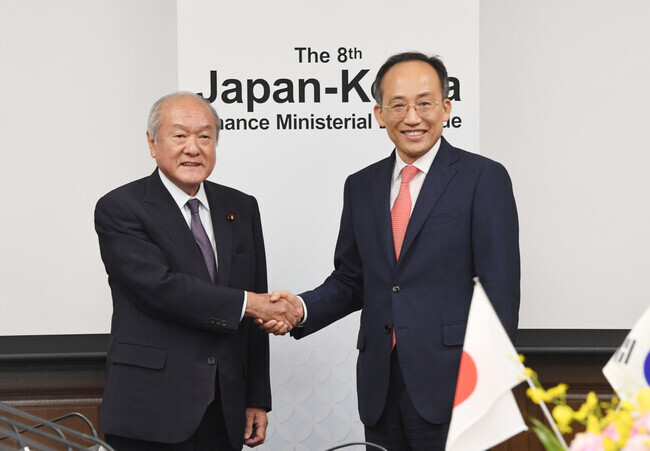hankyoreh
Links to other country sites 다른 나라 사이트 링크
S. Korea, Japan to resume US$10 B currency swap pact

After letting it lapse in 2015, South Korea and Japan are finally reviving their currency swap pact. The US$10 billion deal is meant to strengthen financial cooperation between the two countries amid improving bilateral relations.
Choo Kyung-ho, South Korea’s minister of economy and finance, and Shunichi Suzuki, minister of finance of Japan, announced the agreement following their meeting on Thursday in Tokyo. The last meeting between the two neighbors’ finance ministers took place seven years ago, in 2016.
In a pact that will last for three years, Choo and Suzuki agreed to reinstate currency swaps worth US$10 billion, the same as when it expired in February 2015. Going forward, South Korea will be able to swap US$10 billion worth of South Korean won for US$10 billion held by Japan.
The two countries first agreed on a currency swap deal in 2001, starting with US$2 billion. The dollar value increased to US$30 billion during the 2008 financial crisis and US$70 billion during the 2011 European financial crisis.
However, the agreement was terminated in February 2015 without an extension for the expiration date after bilateral relations froze over former President Lee Myung-bak’s visit to Dokdo in 2012, followed by former Japanese Prime Minister Shinzo Abe’s visit to Yasukuni Shrine.
The agreement brings the overall number of South Korea’s foreign currency swap deals to 10, totaling US$148.2 billion. Among these swap agreements, there is the Chiang Mai Initiative Multilateralisation (CMIM) worth US$38.4 billion, a multilateral currency swap with Japan, ASEAN Plus Three (10 members of the Association of Southeast Asian Nations), and Korea, China, and Japan.
The resumption of the swap is more political than economic. South Korea has the world’s ninth-largest foreign exchange reserves at US$421 billion as of the end of May, and the won-dollar exchange rate has stabilized at around 1,300 won.
“The Korea-Japan currency swap establishes a framework for solidarity and cooperation in the field of foreign exchange and finance with countries that share universal values such as Korea, the US and Japan,” said Choo. “This means that the foreign currency liquidity safety net among advanced countries with free market economies will be extended to our financial and foreign exchange markets.”
Following their meeting, the two finance ministers also urged Russia to stop its war and agreed to respond together to issues like the concentration of suppliers in China and the North Korean security issue.
By Park Jong-o, staff reporter
Please direct questions or comments to [english@hani.co.kr]

Editorial・opinion
![[Column] The miscalculations that started the Korean War mustn’t be repeated [Column] The miscalculations that started the Korean War mustn’t be repeated](https://flexible.img.hani.co.kr/flexible/normal/500/300/imgdb/original/2024/0630/9717197068967684.jpg) [Column] The miscalculations that started the Korean War mustn’t be repeated
[Column] The miscalculations that started the Korean War mustn’t be repeated![[Correspondent’s column] China-Europe relations tested once more by EV war [Correspondent’s column] China-Europe relations tested once more by EV war](https://flexible.img.hani.co.kr/flexible/normal/500/300/imgdb/original/2024/0628/7617195640940814.jpg) [Correspondent’s column] China-Europe relations tested once more by EV war
[Correspondent’s column] China-Europe relations tested once more by EV war- [Correspondent’s column] Who really created the new ‘axis of evil’?
- [Editorial] Exploiting foreign domestic workers won’t solve Korea’s birth rate problem
- [Column] Kim and Putin’s new world order
- [Editorial] Workplace hazards can be prevented — why weren’t they this time?
- [Editorial] Seoul failed to use diplomacy with Moscow — now it’s resorting to threats
- [Column] Balloons, drones, wiretapping… Yongsan’s got it all!
- [Editorial] It’s time for us all to rethink our approach to North Korea
- [Column] Why empty gestures matter more than ever
Most viewed articles
- 1[Column] The miscalculations that started the Korean War mustn’t be repeated
- 2Dreams of a better life brought them to Korea — then a tragic fire tore them apart
- 3Yoon echoed conspiracy theories about Itaewon disaster, former National Assembly speaker says
- 4[Reportage] On Yeonpyeong Island, residents fear military drills will snowball into war
- 5Son Heung-min’s father, brother accused of child abuse at football academy
- 6[Correspondent’s column] Who really created the new ‘axis of evil’?
- 7S. Korea joins US, Japan for first multi-domain drills at a time of escalating tensions
- 8Women gather to protest biased investigations into hidden-camera incidents
- 9[Column] Action on climate change isn’t driving inflation – fossil fuels are
- 10[Photo] K-pop: For everyone, everywhere